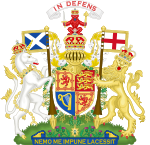- Children's Hearing
-
Scots law

This article is part of the series:
Law of ScotlandAdministrationCivil courtsCriminal courtsSpecial courtsCriminal prosecution- Lord Advocate
- Crown Office
- Advocate Depute
- Procurator Fiscal
-
-
- Fiscal fine
- Precognition
-
Legal profession- Faculty of Advocates
- Law Society of Scotland
- Solicitor-Advocate
- Solicitor
- Association of Commercial Attorneys
A Children’s Hearing is part of the legal and welfare systems in Scotland; it aims to combine justice and welfare for children and young people.
A Children’s Hearing is carried out by three specially trained lay tribunal members of the Children’s Panel, a Children's Reporter, child and legal guardian and a representative of the local social work department. The Children's Reporter takes no part in the decision making process of a Children's Hearing. A change to the role was introduced in September 2009 and the Reporter is able to make representations if the Panel is at risk of making a decision which is not, in the Reporter’s view, competent or procedurally correct. The Reporter is responsible for the administration of the Hearing and also represents the decisions of hearings in a court setting when grounds of referral are disputed or the child is too young to express a view on the grounds for referral. There is a separate panel for each local authority area.
Contents
Procedure
Children referred to hearings are first referred to the Scottish Children's Reporters Administration. Uniquely in Scotland, referrals may be made on offence grounds and/or care and protection grounds. The Children's Reporter investigates the case (usually via information provided by the social work department) and will decide whether or not compulsory measures of supervision may be required. If, in the Reporter's opinion, such measures are required, a Hearing will be arranged. The Reporter may take other steps short of arranging a Hearing, for example arrange for some form of restorative justice. On average, of every five children referred to the Reporter, one is referred to a hearing.
Any child generally under the age of 16, or under the age of 18 but still subject to a supervision requirement, who offends is referred to a hearing unless the area Procurator Fiscal decides that the seriousness of the case merits prosecution in either the Sheriff Court or High Court of Justiciary.
For the hearing itself, the children's hearing has the power to appoint a legal representative where the members of the children’s panel consider it likely that there may a recommendation of secure accommodation or where legal representation is needed to allow the child to participate effectively at the hearing. Children’s Legal Representatives are members of special panels maintained by local authorities, with all costs met by the Scottish Executive. The hearing may also appoint an independent person known as a Safeguarder whose purpose is to prepare a report to assist the hearing in reaching a decision; the Safeguarder must act in the best interests of the child, which indeed is the basis of all decisions made by children’s hearings. Each Children's Hearing must consider whether the child's immediate safety is assured. If this is not the case panel members have the power to issue a place of safety warrant. This warrant empowers the social work department to the move the child to "a place of safety" (e.g. Children's Residential Home, Foster Care, the care of relatives). Panel members also have the powers to issue a warrant when necessary to enforce the attendance at hearings of those invited.
Supervision requirements
Hearings have power to make a wide range of conditions on a disposal called a Supervision Requirement. These conditions may range from attendance on a particular programme, conditions regulating contact with parents or other significant adults/family members, contact with a social worker, placement in foster care, residential accommodation or secure accommodation. Once issued a Supervision Requirement must be reviewed by a Hearing within 12 months. Guardians and children can ask for this to be reviewed at any stage after 3 months. The social work department have powers to ask for the requirement to be reviewed though at any time.
History
The children’s hearings system was initiated by the Social Work (Scotland) Act 1968, now incorporated in the Children (Scotland) Act 1995. It followed a report in April 1964 of a committee set up by the Secretary of State for Scotland under the chairmanship of Lord Kilbrandon, a Senator of the College of Justice, to examine how young offenders were dealt with.
The existing juvenile courts were regarded as unsuitable because they had to combine the characteristics of a criminal court with those of a treatment agency. Separation of functions was recommended. The establishment of the grounds of referral (where disputed) was to remain with the courts but decisions on treatment were to be the responsibility of a new and unique kind of tribunal, which would be neither a court of law nor a local authority committee. On April 15, 1971, hearings took over from the courts most of the responsibility for children under 16.
See also
- Scots law
- Sheriff Court
- High Court of Justiciary
- Crown Office
- Scottish Government
- Courts of Scotland
External links
Categories:- 1971 establishments
- 1971 in Scotland
- Scottish court systems
- Scottish society
- Child welfare
- Children's rights in the United Kingdom
- Scots family law
- Lord Advocate
Wikimedia Foundation. 2010.
